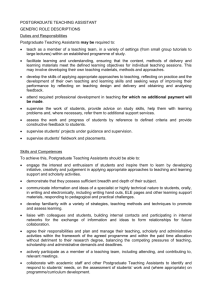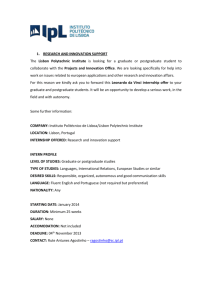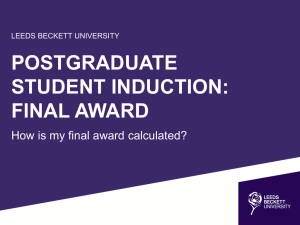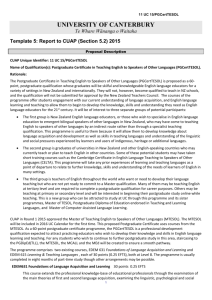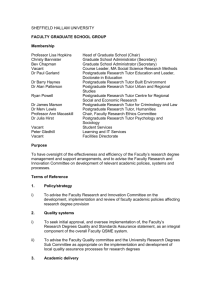Postgraduate Diploma of Business Information Systems
advertisement
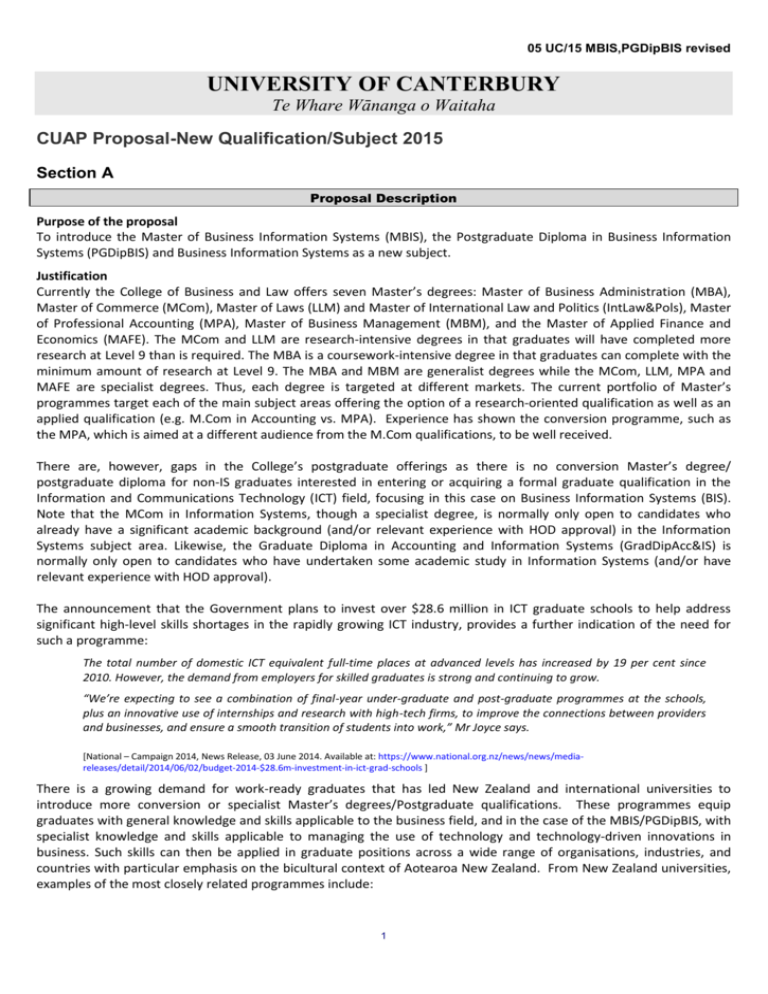
05 UC/15 MBIS,PGDipBIS revised UNIVERSITY OF CANTERBURY Te Whare Wānanga o Waitaha CUAP Proposal-New Qualification/Subject 2015 Section A Proposal Description Purpose of the proposal To introduce the Master of Business Information Systems (MBIS), the Postgraduate Diploma in Business Information Systems (PGDipBIS) and Business Information Systems as a new subject. Justification Currently the College of Business and Law offers seven Master’s degrees: Master of Business Administration (MBA), Master of Commerce (MCom), Master of Laws (LLM) and Master of International Law and Politics (IntLaw&Pols), Master of Professional Accounting (MPA), Master of Business Management (MBM), and the Master of Applied Finance and Economics (MAFE). The MCom and LLM are research-intensive degrees in that graduates will have completed more research at Level 9 than is required. The MBA is a coursework-intensive degree in that graduates can complete with the minimum amount of research at Level 9. The MBA and MBM are generalist degrees while the MCom, LLM, MPA and MAFE are specialist degrees. Thus, each degree is targeted at different markets. The current portfolio of Master’s programmes target each of the main subject areas offering the option of a research-oriented qualification as well as an applied qualification (e.g. M.Com in Accounting vs. MPA). Experience has shown the conversion programme, such as the MPA, which is aimed at a different audience from the M.Com qualifications, to be well received. There are, however, gaps in the College’s postgraduate offerings as there is no conversion Master’s degree/ postgraduate diploma for non-IS graduates interested in entering or acquiring a formal graduate qualification in the Information and Communications Technology (ICT) field, focusing in this case on Business Information Systems (BIS). Note that the MCom in Information Systems, though a specialist degree, is normally only open to candidates who already have a significant academic background (and/or relevant experience with HOD approval) in the Information Systems subject area. Likewise, the Graduate Diploma in Accounting and Information Systems (GradDipAcc&IS) is normally only open to candidates who have undertaken some academic study in Information Systems (and/or have relevant experience with HOD approval). The announcement that the Government plans to invest over $28.6 million in ICT graduate schools to help address significant high-level skills shortages in the rapidly growing ICT industry, provides a further indication of the need for such a programme: The total number of domestic ICT equivalent full-time places at advanced levels has increased by 19 per cent since 2010. However, the demand from employers for skilled graduates is strong and continuing to grow. “We’re expecting to see a combination of final-year under-graduate and post-graduate programmes at the schools, plus an innovative use of internships and research with high-tech firms, to improve the connections between providers and businesses, and ensure a smooth transition of students into work,” Mr Joyce says. [National – Campaign 2014, News Release, 03 June 2014. Available at: https://www.national.org.nz/news/news/mediareleases/detail/2014/06/02/budget-2014-$28.6m-investment-in-ict-grad-schools ] There is a growing demand for work-ready graduates that has led New Zealand and international universities to introduce more conversion or specialist Master’s degrees/Postgraduate qualifications. These programmes equip graduates with general knowledge and skills applicable to the business field, and in the case of the MBIS/PGDipBIS, with specialist knowledge and skills applicable to managing the use of technology and technology-driven innovations in business. Such skills can then be applied in graduate positions across a wide range of organisations, industries, and countries with particular emphasis on the bicultural context of Aotearoa New Zealand. From New Zealand universities, examples of the most closely related programmes include: 1 05 UC/15 MBIS,PGDipBIS revised Master of Information Management, Victoria University of Wellington (taught Master’s aimed at mid-career IT professionals, similar to the MBA): http://www.victoria.ac.nz/sim/study/postgraduate/mim Master of Business/Professional Business with the option to include INFO papers, Auckland University of Technology. This programme currently offers five 800-level elective papers. https://www.aut.ac.nz/study-at-aut/study-areas/business/qualifications/postgraduate/postgraduateinformation-technology MCom in Information Systems (180-point), Victoria University of Wellington. This programme is aimed at advancing IS majors (or similar) http://www.victoria.ac.nz/sim/study/postgraduate/mcom MCom in Information Systems (240 points, University of Auckland). This degree is aimed at advancing IS majors Master of Information Science (240-points, blend of Computer Science and Information Technology), Massey University Most Australian universities with an Information Systems major also offer conversion degrees and specialist Information Management/Information Systems Master’s degrees, for example: Master of Information Systems (Systems Management Focus), The University of Melbourne. http://msi.unimelb.edu.au/study/graduate/master-of-information-systems/ Master of Information Technology (Business Information Systems), University of South Australia. http://programs.unisa.edu.au/public/pcms/program.aspx?pageid=3862&sid=6918 Master of Information Systems Management, University of New South Wales. https://www.business.unsw.edu.au/programs-courses/postgraduate-coursework/master-information-systemsmanagement Master of Business Information Systems, Monash University. http://www.monash.edu.au/pubs/handbooks/courses/3342.html Master of Information Systems, Deakin University. http://www.deakin.edu.au/course/master-of-informationsystems-business The market for conversion programmes is developing rapidly in New Zealand, and will continue to increase with the lowering of the minimum number of points required for a Master’s degree from 240 to 180 points. Accordingly, a number of NZ universities and other tertiary institutions have begun to address the opportunity by offering new 180 point taught Master’s degrees. Given the international trend towards conversion and specialist Master’s programmes that can be completed in less than two years (e.g. from 12 to 18 months), it is anticipated the proposed programme will be able to gain sufficient enrolments to be viable for the University of Canterbury. It is also expected to provide the University of Canterbury with the opportunity to further its engagement in the international market. Specialist and conversion Master’s programmes align with the University of Canterbury’s Strategic Plan in respect to the following goals: Growth of student numbers; Development of highly sought after graduates; and Operating as an internationally recognised provider of postgraduate qualifications. The Government, through its investment policies and business communities, has also indicated that ICT-specific skills are critical to the growth and development of many business sectors not only in Christchurch but also across New Zealand. The opportunities span most fields of employment, as more and more employers seek to engage more IT-savvy employees. The introduction of a specialist Master’s/Postgraduate Diploma degree will facilitate the achievement of such skills and help University of Canterbury’s graduates meet this demand in the market, irrespective of their undergraduate discipline. Accordingly, the programme may also help invigorate the recruitment opportunities for undergraduate degrees in the various Colleges at the University of Canterbury without cannibalising existing offerings in Commerce, and potentially boosting EFTS in non-Commerce fields. A key feature of the University of Canterbury MBIS/PGDipBIS programme will be the inclusion of opportunity to complete an Internship which is the equivalent of 15 points (Level 9). Students will work on a clearly identified project in 2 05 UC/15 MBIS,PGDipBIS revised a firm or company in an information systems/management-related role and write a report about their experience, contrasting it with the theoretical and applied nature of the material they have covered during the programme. They will also be required to provide a series of key recommendations based on their observation. The programme’s flexibility and structure means that there is also an opportunity to incorporate knowledge from other disciplines that have been recognised as vital to the ICT discipline, the College and the University of Canterbury as a whole (e.g. Computer Science/Software Engineering, Accounting, Marketing, Entrepreneurship, Psychology, Digital Humanities, Māori and Indigenous Studies, Health Sciences). For example, with the approval of the respective Heads of Department/Programmes, there is the opportunity for students with interests in Māori-related issues to include appropriate courses from the Māori and Indigenous Studies programme in the MBIS. The courses that are included in the information systems curriculum being largely of a technical nature generally do not include a great deal of content that is specific to particular cultural groups or facets (such as the Treaty of Waitangi). Nonetheless in keeping with University of Canterbury’s strategic intent and vision of contributing to Māori and indigenous development regionally, nationally and internationally and accordingly the objectives of Rautaki Whakawhanake Kaupapa Māori, alongside the opportunity to include Māori and Indigenous development-related course electives, the MBIS programme also includes core courses/electives with content that explicitly relates to ethical and cultural issues of relevance to various cultural groups and interests including biculturalism in Aotearoa New Zealand, with opportunities for further engagement through the internship and research project. The involvement of Māori guest speakers and lecturers will provide opportunities to enhance further the bicultural aspects and distinctiveness of the IS-related component. Further, for the business-related component, some of the courses explore the impact of The Treaty of Waitangi on the New Zealand business community and draw on New Zealand’s rich cultural heritage in order to extend the cultural competence of students. The programme will be taught by the College of Business and Law staff and professional, qualified contractors from the local business community (including academic staff and professionals with competencies in Māori and Indigenous development-related IS topics). The proposed courses are closely aligned with the teaching and research expertise of the College staff. By teaching into the programme and supervising students’ research projects and internships, the faculty will have the opportunity to disseminate their research and further their own research agendas. The use of professional, qualified contractors will enable the University, and particularly MBIS/PGDIPBIS students, to connect with and contribute to the local business community. Guest speakers working in the public and private sectors including those working with Māori organisations will also be invited to contribute to the programme. Acceptability Consultation with external stakeholders including Tait Communications and Jade Software Corporation has also provided evidence that graduates of the proposed programme will be well received in the market. The growing demand for work-ready graduates who possess specialist skills from their postgraduate degree in Information Systems/ ICT that complement their prior undergraduate degrees is expected to be supported by business leaders and is believed to be critical to furthering the development and growth of the business sector, the ICT sector and the knowledge base in Canterbury and New Zealand. Feedback has also been sought on this proposal and all courses from: Academic Managers and Deans of other faculties and the Dean of Postgraduate Research Associate Dean Māori (School of Business and Economics) Postgraduate Management Development Director Office of the Associate Vice Chancellor Māori UC Library UCSA New Zealand IS Heads of Department Overall feedback has been positive on this proposal. Goals of the programme The aim of the programme is to provide students from a non-IS background with the skills, knowledge and competencies needed to engage and actively participate in Information Systems-related areas in business and commerce at the postgraduate level. The main goal is to equip students with specialist knowledge and skills in Information Systems. This is complemented by generalist knowledge in Business Management, and both IS-related and 3 05 UC/15 MBIS,PGDipBIS revised generalist knowledge regarding biculturalism in Aotearoa New Zealand and global and multicultural conditions impacting the field. This will enable them to understand the connections between the disciplines and be able to apply this knowledge to a range of issues that organisations face. Further, graduates will develop advanced analytical, problem-solving and critical thinking skills that will enable them to improve upon existing practice and position themselves as the future leaders in business. Graduate profile The Master’s and Postgraduate Diploma in Business Information Systems programmes will provide students with the skills, knowledge and competencies to undertake entry-level Information Systems-related roles within an organisation, and a good foundation for developing further and moving into more advanced roles in IT management which contribute to the strategic development of organisations through technology both in New Zealand and internationally. Entry-level roles include business analyst, business process analyst, and business intelligence analyst, while more advanced roles include IT consultant, IT project manager, and IT manager. While the type and nature of the roles that graduates will undertake immediately after graduating may include roles similar to those offered to BCom major graduates who have majored in Information Systems, the advanced research and applied components of the MBIS/PGDipBIS will provide them with additional skills in the areas of analysing, synthesising and communicating information effectively to a wide audience. This is supported by the internship and research project and should allow students to advance their IS careers at a greater speed than their BCom major counterparts. Also the skills and knowledge gained from their previous undergraduate study should allow MBIS students to gain a deeper level of engagement with the taught material within the courses. The MBIS/PGDipBIS programmes are designed to prepare students for entry-level ICT-related roles within the public and private sectors. MBIS graduates will have the following attributes and abilities: Attribute 1: Critically competent in Business Information Systems Demonstrate an in-depth knowledge and understanding of, and be able to critically evaluate and apply this knowledge to, key topics and issues related to the management and use of Information Systems. Plan and carry out independent study that demonstrates critical awareness of the academic and professional literature and key issues within the field of Information Systems, and effectively communicate their findings to a wide audience. Attribute 2: Employable, innovative and enterprising within the Business and/or ICT Industry Obtain key skills and attributes sought by employers within the fields of Information Systems, Business and Management such as analytical skills, problem solving skills, communication skills, ability to work in a team, process modelling skills, and the ability to carry out a user requirements analysis. Attribute 3: Biculturally competent and confident Demonstrate awareness and understanding of the nature of biculturalism in Aotearoa New Zealand, and its relevance to the field of Information Systems. Attribute 4: Engaged in the Business and/or ICT community Demonstrate an understanding of the thinking, norms and practices that underpin the management and use of Information Systems in organisations, and reflect on their own performance and experience within that community. Attribute 5: Globally aware Demonstrate an understanding of the influence of global conditions on the field of Information Systems and be competent in engaging with global and multi-cultural contexts. A PGDipBIS graduate will have the following attributes and abilities: Attribute 1: Critically competent in Business Information Systems Demonstrate advanced knowledge and understanding of, and be able to critically evaluate and apply this knowledge to, key topics and issues related to the management and use of Information Systems. 4 05 UC/15 MBIS,PGDipBIS revised Attribute 2: Employable, innovative and enterprising within the Business and/or ICT Industry Obtain key skills and attributes sought by employers within the fields of Information Systems, Business and Management such as Analytical skills, problem solving skills, communication skills, ability to work in a team, process modelling skills, and ability to carry out a user requirements analysis. These attributes and associated higher learning objectives are explicitly supported in the MBIS/PGDipBIS curriculum as follows: Core Courses Graduate Attributes IS Professional Knowledge (Electives) Research Project * MBIS 601 MBIS 602 MBIS 603 MBIS 621 MBIS 622 MBIS 623 MBIS 624 MBIS 691 MBIS 680 Attribute 1: Critically competent in in Business Information Systems X X X X X X X X X MBAZ 604 Attribute 2: Employable, Innovative and Enterprising within the Business and/or ICT Industry X X X X X X X X X MBAZ 604 Attribute 3: Biculturally competent and confident X X X MBAZ 605 X X X X Attribute 4: Engaged in the Business and/or ICT community Attribute 5: Globally aware X X Other Note: While most courses will have content linked to several attributes, the focus here is on those with significant content that explicitly addresses the attribute in relation to the IS field. (As such only some of the business knowledge courses and other electives are listed above) *Depending on the nature/subject of the internship/research project this course may provide opportunities to develop further one’s competence in relation to this attribute (e.g. Attribute 2: Biculturally competent and confident - internship with Ngāi Tahu or other Māori–related organisations, research on topics related to the management and use of IS to support Māori organisational strategies and informational needs; Attribute 5: Globally aware – internship or project that deals with the impacts of global conditions on an IS issue or provides opportunity for engagement in a global/multi-cultural setting, e.g. Green IS, IT for Development) Outcome statement The MBIS/PGDipBIS will provide opportunities for graduates to develop the skills, knowledge and competencies that will allow them to gain employment within the private and public sectors in relevant business positions, and be highly effective Information Technology Managers/Professionals to organisations both domestically and internationally. The research project and internship will provide graduates with an opportunity to utilise the knowledge gained within the programme and apply it to real work problems and situations. This will present them with an opportunity to prove their skill in IS/ICT-related areas and business competencies and to interact with external stakeholders in a professional manner and an industry relevant environment. Through academic research, graduates will gain an understanding of the theoretical and practical considerations facing the IS profession and gain the confidence to question existing IS/ICT-related practices and participate in the development of new and innovative ways to resolve issues related to the IS/ICT field and the use of ICTs in business, and assure the alignment of IS/ICT investments with corporate business strategies. Programme overview The programme will be offered over a 12 to 15 month period, using a four to five semester model (similar to the current MBM programme). The degree can be taken part time over a maximum of four (4) years. The courses required for the MBIS will be divided into four stages. 5 05 UC/15 MBIS,PGDipBIS revised A total of 9 courses (15 points each) and a Research Project (45 points) must be completed to obtain the MBIS qualification, as follows: Three courses from Group A (Core IS knowledge). Three courses from Group B – these are the elective IS knowledge options. Three courses from Group C - MBAZ604 Business Research Methods must be completed plus two elective business knowledge options. Applied research project from Group D – MBIS680 Research Project The nine courses above must be completed to an overall B+ grade average in order for the student to move on to the capstone Research Project (MBIS 680, 45 points). For the PGDipBIS, a total of eight courses (15 points each) must be completed to obtain the qualification, as follows: Three courses from Group A (Core IS knowledge). Five courses from Group B and/or Group C, including at least two courses from Group B – these are the elective IS professional knowledge and core business options. Group A Core Information Systems Professional Knowledge (45 points at Level 8 from any of MBIS601 - MBIS609): MBIS601 Management of Information Systems MBIS602 Systems Analysis and Business Process Design MBIS603 Digital Business and Technology Group B Information Systems Professional Knowledge – Electives (45 points at Level 8 from MBIS620 - MBIS670 or INFO620 – INFO670; or Level 9, MBIS691): MBIS621 IT Project Management MBIS622 IS Security and Risk Management MBIS623 Data Management MBIS624 Data Analytics and Business Intelligence Systems in Organisations MBIS691 Information Systems Internship 15 points from INFO620-INFO670 15 points from another relevant subject at NQF Level 8 or higher subject to approval by the relevant Head of Department and the Dean. Group C Core Business Knowledge (MBAZ604 Business Research Methods, plus 30 points at Level 8 from any of the following): MBAZ601 Managerial Accounting MBAZ602 Business Economics MBUS650 Business Strategy 15 points from another relevant subject at NQF Level 8 or higher subject to approval by the relevant Head of Department and the Dean. Group D Applied Research (45 points at Level 9) • MBIS680 Research Project Waivers: Students who have completed an undergraduate degree that includes any of the equivalent undergraduate courses may substitute the relevant MBIS course with other MBIS, INFO, or COSC/SENG or other approved courses by requesting a waiver. The Core Information Systems Knowledge and elective courses will provide a foundation from which more advanced learning can be undertaken in the research project or internship. To align with the College’s strategic direction particular attention will be given to learning outcomes that external stakeholders consider to be relevant to information systems postgraduates. The core courses aim to provide students with the foundations needed to (i) understand how businesses today use technology to deliver business value, support business strategy, enhance stakeholder engagement, create better business processes and improve decision-making, (ii) recognise opportunities for IT use in organisations and (iii) advance 6 05 UC/15 MBIS,PGDipBIS revised through the MBIS programme. Students will be required to apply this knowledge to a number of theoretical and practical situations and critically analyse the information gained at that level. The Internship will provide an opportunity for students to apply their knowledge to a real world problem, allowing them to again confidence in dealing in a professional business environment, as well as engaging in a deeper level of learning through application of critical thinking and problem solving. The applied Research Project will provide the opportunity for students to apply their knowledge to practice, allowing them to again confidence in working in a professional business environment, as well as engaging in a deeper level of learning through application of critical thinking and problem solving. For students to progress to the applied Research Project, they will need the approval of the Head of the ACIS Department. This approval will normally be based on passing: (i) 45-points from the Core Knowledge courses in Group A (ii) MBAZ604 Business Research Methods, plus a further 30-points from the schedule of courses to the degree, and (iii) achieving at least a B+ grade average in 90-points from the MBIS schedule of courses to the degree. This will also allow students to apply for their research projects before the completion of all of the courses offered within the MBIS programme. It is estimated that most students will want to enrol in the Research Project or Internship in the third term. This will allow sufficient time for either to be undertaken. Internship For students to progress to the Internship programme they will need the approval of the Head of the ACIS Department. This approval will normally be based on achieving a minimum B+ grade point average across 60-points in the programme including 45-points of the Core/Advanced IS knowledge courses (from Group A or Group B of the schedule of courses to the degree). This will also allow students to apply for Internships before the completion of all the courses offered in the MBIS/PGDipBIS programme. The Internship will consist of 100 hours of work (on a discrete IS-related project) within an organisation followed by a report on the student’s experience. The report will include an analysis of the organisation and the IS project under consideration (including its context), reviewing existing academic literature and provide high-level recommendations on areas for improvement. Note that a similar report is required in the MBM programme. Note also that a similar report is required in the Executive Insight Programme currently run by the Chartered Accountants Australia and New Zealand in conjunction with the University of Canterbury and Lincoln University. Early Exit Option (Postgraduate Diploma) A candidate for the degree who has satisfied all requirements for the Postgraduate Diploma in Business Information Systems may apply to withdraw from the MBIS programme and be awarded the diploma. Treaty of Waitangi The core content of the Information Systems knowledge courses and electives is largely of a technical nature so generally does not include significant content that is explicitly related to the Treaty of Waitangi. However some content (e.g. Management of Information Systems - MBIS601, listed in Group A) relating to ethical and cultural matters impacting the management and use of IS in organisations explicitly includes content related to the impacts of biculturalism in Aotearoa New Zealand and Indigenous development, to address issues of relevance to Māori and other cultural groups and interests. For the business-related component, some of the courses explore the impact of the Treaty of Waitangi on the New Zealand business community and draw on New Zealand’s rich cultural heritage in order to extend the cultural competence of students. In addition all students in the MBIS/PGDipBIS programme are able to take Business Law - MBAZ605 (listed in Group C) which directly addresses treaty issues in business and society. Proposed teaching/delivery methods The delivery methods for the IS professional knowledge courses will be a combination of lectures, lab work where applicable, and group work (e.g. case study analysis, applied project work). The lectures will be scheduled for delivery within each of the four/five terms. Each term will consist of ten weeks with three hours of lectures per week. Students will be expected to undertake a minimum of 120 hours of self-study outside lecture times, including research and review of academic journal articles and professional/ practitioner journal articles, project work, lab work, case study analysis, field work, specific textbooks, and other learning tasks. 7 05 UC/15 MBIS,PGDipBIS revised Assessment procedures Assessment procedures will include a combination of: Individual tests and exams (invigilated and take-home) Group and individual projects/reports Group and individual presentations Literature reviews Each course co-ordinator will be responsible for the choice of assessment. The programme coordinator will review the teaching methods and assessment procedures to ensure they are consistent with best practice in tertiary education and that learning objectives are met. The Faculty will develop an Assurance of Learning Programme for this qualification that will identify and measure the learning objects specified for the programme. The MBIS teaching staff and, where relevant (because of the specific and/or technical nature of the reports), other College or UC staff will be the examiners for the internship report and the project. Resources The programme will require the following resources: Lecture room capable of seating up to 35 students (full audio visual equipment) Study space for students (shared facility with adequate desk space and common area) Administration staff (no extra resourcing) Programme management (no extra resourcing) Lecture staff (combination of current Faculty and external professional contractors, including academic staff and/or professional contractors with Māori-related competencies in the relevant subject area) Supervisory staff for the Research Project and Internships (current Faculty will be used. However if this resource is exceeded then contractors with suitable academic backgrounds will be used) IT equipment (computers and shared printer), including Internet access Some tutorial assistance Internship sponsors from the local community (including Ngāi Tahu and other Māori organisations) In addition a working party (including the Associate Dean Māori, School of Business and Economics) has been formed to explore and develop further opportunities for students to enhance their competence and confidence in biculturalism and its relevance in Aotearoa New Zealand and to the field of Information Systems. Library and eLearning Resources The University of Canterbury Librarian, as well as the liaison librarian and flexible learning advisor to the College, have confirmed that the current resources will meet the needs of the proposed programme. No additional resources are required. Plans for monitoring programme quality A curriculum committee will be established that will review the content of the programme on a regular basis. Pre- and post-course meetings will be held with all teaching staff, the Director of Postgraduate Management Programmes and chaired by the Head of the ACIS Department. The programme will have developed learning outcomes as required for AACSB accreditation and monitor the performance of the offerings in line with the external stakeholder requirements. Lecturer and course student evaluations will be mandatory for all courses and administered through the Centre for Evaluation and Monitoring at the University of Canterbury. Confirmation that Section B has been prepared and is available to CUAP on request Section B has been prepared and is available on request. For New Qualifications – TEC/NZQA/NZVCC Requirements EFTS value of qualification: 1.5 NZSCED code: 080399 NZQA exit level of qualification to go on the New Zealand Qualifications Framework:Level 9 Memorandum of understanding: Not Applicable 8 05 UC/15 MBIS,PGDipBIS revised Duration of the Qualification Minimum number of points to complete the qualification: MBIS 180 points, PGDipBIS 120 points Vacation/recess weeks Vacation/recess weeks for 2015/2016 are approximated as follows: 12 April 2016 to 24 April 2016 05 July 2016 to 17 July 2016 27 September 2016 to 09 October 2016 13 December 2016 to 31 January 2016* *Subject to the completion of the project Work experience/placement hours per week The Internship will require a minimum of 100 contact hours. The research project will require a minimum of 40 contact hours with the sponsor company. However this may vary depending on the organisation and the project undertaken. Tuition/teaching (full-time equivalent) weeks (including exam and study weeks) The programmes will have two main points of entry, October and February. Those commencing in October are expected to finish in February and those starting in February to finish in June of the following year. However, research projects will be due for submission no later than 31 January the following year. A two week term break will exist between Terms 1, 2 and 3. The proposed timetable for 2015/2016 is as follows: Term 1 - 12 October 2015 to 14 December 2015 Term 2 - 01 February 2016 to 11 April 2016 Term 3 - 25 April 2016 to 04 July 2016 Term 4 - 18 July 2016 to 26 September 2016 Term 5 - 10 October to 12 December 2016* *This may apply to domestic students who do not complete the project over the December, January period after term four. Teaching hours per week Each course will have a minimum of three (3) teaching hours per week. Self-directed learning hours per week For the Core and Elective Information Systems knowledge courses students will be expected to undertake a minimum of 12 hours per week, including literature reviews, text and journal readings, lab work as required, study, exam preparation, project work and presentation preparation. The level of additional time spent will be dependent on the skills and competencies of each student and their level of general understanding in the field of study. Calendar Form New Qualification Regulations UC Calendar 2015 Page 89 Under: Commerce Graduate and Postgraduate Qualifications Time Limit Schedule Add: Full-time Min (mths) Max (mths) MBIS 12 15 UC Calendar 2015 Page 246 Part-time Min (mths) 24 The Degree of Master of Business Information Systems (MBIS) 9 Max (mths) 48 05 UC/15 MBIS,PGDipBIS revised See also General Course and Examination Regulations 1. Qualifications Required to Enrol in the Degree Every candidate for the Degree of Master of Business Information Systems, before enrolling in the course of study for this degree, shall have: (a) qualified for a New Zealand university degree with at least a B grade average in 300-level courses, or equivalent, or been admitted ad eundem statum as the holder of such a degree; and (b) been approved as a candidate for the degree by the Dean of Commerce. 2. Structure and Requirements of the Degree To qualify for the degree a candidate must pass: (a) 0.375 EFTS (or 45 points) of courses listed in Group A of the schedule to the degree; and (b) 0.375 EFTS (or 45 points) of courses listed in Group B of the schedule to the degree; and (c) 0.375 EFTS (or 45 points) comprised of MBAZ604 plus 30 points from courses listed in Group C of the schedule to the degree. (d) 0.375 EFTS (or 45 points) of courses listed in Group D of the schedule to the degree. 3. Credit Based Upon Previous Studies A candidate, on the basis of previous studies, may be exempt from courses in the Schedule to the Regulations for the Degree of Master of Business Information Systems and will replace these courses with other appropriate postgraduate courses as approved by the Head of Department. 4. Repeating of Courses A candidate is permitted to repeat a maximum of two courses. MBIS691 and MBIS680 cannot be repeated. 5. Approval of Course of Study The personal course of study of a candidate shall be approved by the Dean of Commerce. The structure of the MBIS programme is closely prescribed. A candidate may, with the approval of the Dean, replace up to 0.125 EFTS (or 15 points) in courses from Group B and up to 0.125 EFTS (or 15 points) from Group C of the schedule to the degree with courses prescribed for another subject at an equivalent level. 6. Time Limits A candidate shall complete the programme of study in accordance with the time limits set out in the Commerce Graduate and Postgraduate Qualifications Time Limit Schedule starting from the date of first enrolment for the Master of Business Information Systems. 7. MBIS with Distinction The degree may be awarded with Distinction. 8. Award of PGDipBIS instead of MBIS A candidate for the degree who has satisfied all requirements for the Postgraduate Diploma in Business Information Systems may apply to withdraw from the degree and be awarded the diploma. Schedule to the Regulations for the Degree of Master of Business Information Systems/Postgraduate Diploma in Business Information Systems Group A Course Code MBIS 601 MBIS 602 Course Title Management of Information Systems Systems Analysis and Business Process Design EFTS 0.125 2016 T4 0.125 T1 10 P/C/R/RP/EQ P: Subject to the approval of the Head of Department P: Subject to the approval of the Head of Department 05 UC/15 MBIS,PGDipBIS revised MBIS 603 Digital Business and Technology 0.125 T2 P: Subject to the approval of the Head of Department Group B Course Code MBIS 621 Course Title IT Project Management EFTS 0.125 2016 T2 MBIS622 IS Security and Risk Management 0.125 T3 MBIS623 Data Management 0.125 T3 MBIS624 Data Analytics and Business Intelligence Systems in Organisations Internship 0.125 NO 0.125 A P/C/R/RP/EQ P: Subject to the approval of the Head of Department P: Subject to the approval of the Head of Department P: Subject to the approval of the Head of Department P: Subject to the approval of the Head of Department P: Subject to the approval of the Head of Department MBIS691 15 points from another relevant subject at NQF Level 8 or higher, subject to approval by the relevant Head of Department and the Dean. Group C Course Code MBAZ 601 Course Title Managerial Accounting EFTS 0.125 2016 T1 MBAZ602 Business Economics 0.125 T1 MBAZ604 Business Research Methods 0.125 T2 MBUS650 Business Strategy 0.125 T3 P/C/R/RP/EQ P: Subject to the approval of the Director of Postgraduate Management Development R: MBUS611, MBAD601 P: Subject to the approval of the Director of Postgraduate Management Development R: MBAD604, MBUS614 P: Subject to the approval of the Director of Postgraduate Management Development R: MBUS642, MBAD679 P: Subject to the approval of the Director of Postgraduate Management Development R: MBUS624, MBAD631,MBAD632 15 points from another relevant subject at NQF Level 8 or higher, subject to approval by the relevant Head of Department and the Dean. Group D Course Code MBIS680 Course Title Research Project EFTS 0.375 2016 A UC Calendar 2015 Page 89 Under: Commerce Graduate and Postgraduate Qualifications Time Limit Schedule Add: Full-time Min (mths) Max (mths) PGDipBIS 9 15 P/C/R/RP/EQ P: Subject to the approval of the Head of Department Part-time Min (mths) 24 UC Calendar 2015 Page 246 Postgraduate Diploma of Business Information Systems (PGDipBIS) See also General Course and Examination Regulations 11 Max (mths) 48 05 UC/15 MBIS,PGDipBIS revised 1. Qualifications Required to Enrol in the Diploma Every candidate for the qualification of Postgraduate Diploma of Business Information Systems, before enrolling in the course of study for this degree, shall have: (a) qualified for a New Zealand university degree with at least a B grade average in 300-level courses, or equivalent, or been admitted ad eundem statum as the holder of such a degree; and (b) been approved as a candidate for the degree by the Dean of Commerce. 2. Diploma Requirements To qualify for the diploma a candidate must complete a total of 1 EFTS (120 points) from Groups A, B and C of the schedule to the Master of Business Information Systems. 3. Credit Based Upon Previous Studies A candidate, on the basis of previous studies, may be exempt from courses in the Schedule to the Regulations for the Degree of Postgraduate Diploma in Business Information Systems and will replace these courses with other appropriate postgraduate courses as approved by the Head of Department (ACIS). 4. Repeating of Courses Subject to the approval of the Head of the ACIS department, a candidate is permitted to repeat a maximum of two courses. MBIS691 cannot be repeated. 5. Approval of Course of Study The personal course of study of a candidate shall be approved by the Dean of Commerce. The structure of the PGDipBIS programme is closely prescribed. A candidate may, with the approval of the Dean, replace up to 0.25 EFTS (or 30 points) of courses from the schedule to the Master of Business Information Systems with courses prescribed for another subject at an equivalent level. 6. Time Limits A candidate shall complete the programme of study in accordance with the time limits set out in the Commerce Graduate and Postgraduate Qualifications Time Limit Schedule starting from the date of first enrolment for the Postgraduate Diploma in Business Information Systems. UC Calendar 2015 Page 527 Business Information Systems MBIS 601 Management of Information Systems 15 points 0.125 EFTS This course introduces key principles, concepts, and theories related to the management and use of Information Systems to support organisational aims. The course covers information technology concepts, IS and business strategy, IS applications, IS acquisition, governance, IS evaluation, IS and biculturalism. P: Subject to approval of the Head of Department MBIS601-16T4 Special MBIS fee also applies. MBIS 602 Systems Analysis & Business Process Modelling 15 points 0.125 EFTS This course covers key concepts, processes, tools, techniques and frameworks used to analyse and specify the design of information systems, business process and data modelling, the role and responsibilities of the systems analysts and challenges of IS development. P: Subject to approval of the Head of Department MBIS602-16T1 Special MBIS fee also applies. MBIS 603 Digital Business and Technology 15 points 0.125 EFTS This course covers key concepts, principles and frameworks related to digital business strategy and implementation including Business-to-Consumer and Business-to-Business eCommerce and technology infrastructure needed to support 12 05 UC/15 MBIS,PGDipBIS revised these systems. The course also explores ethical, legal, and societal issues related to internet technology use by organisations. P: Subject to approval of the Head of Department MBIS603-16T2 Special MBIS fee also applies. MBIS 621 Project Management 15 points 0.125 EFTS This course covers core principles, tools and techniques for successful IT project management, the role and responsibilities of a project manager and challenges of IT project management. P: Subject to approval of the Head of Department MBIS621-16T2 Special MBIS fee also applies. MBIS 622 IS Security and Risk Management 15 points 0.125 EFTS This course examines how organisations manage risk and eSecurity associated with their information systems. Topics include management, analysis and the application of secure e-Business systems including security policy and network management. P: Subject to approval of the Head of Department MBIS622-16T3 Special MBIS fee also applies. MBIS 623 Data Management 15 points 0.125 EFTS This course introduces students to a range of topics that underpin the successful use and management of databases in contemporary organisations. The course exposes the students to associated real life issues related to data management and database management systems. P: Subject to approval of the Head of Department MBIS622-16T3 Special MBIS fee also applies. MBIS 624 Data Analytics and Business Intelligence Systems in Organisations 15 points 0.125 EFTS This course covers key aspects related to business intelligence (BI) systems and technologies and their application in organisations. The course also covers topics in data warehousing, predictive analytics, data visualisation, data mining (including text and web mining) and emerging trends in BI. P: Subject to approval of the Head of Department Not Offered in 2016 Special MBIS fee also applies. MBIS 680 Research Project 45 points 0.375 EFTS This course provides advanced analytical, theoretical and practically applied business and information-systems-related insight and competencies in the areas relevant to the learning objectives of the program. This course will require students to apply advanced analytical skills and theoretical understanding to real life business information-systems related problems and issues. Students will interact with key stakeholders from industry as part of their research project. P: Subject to approval of the Head of Department MBIS680-16A Special MBIS fee also applies. MBIS 691 Internship 15 points 0.375 EFTS This course will provide exposure to challenges faced by organisation through experiential learning. This will reinforce and develop knowledge from other MBIS and graduate courses by providing students with the opportunity to apply theory to practice. The course also develops problem solving, reflection, and project management and communication skills. P: Subject to approval of the Head of Department MBIS681-16A 13 05 UC/15 MBIS,PGDipBIS revised Special MBIS fee also applies. UC Calendar 2015 Page 39, Section C. Special Programmes: International fees C. Special Programmes: International fees Programme Cost $NZ (2015) Postgraduate Diploma Business Information Systems Master of Business Information Systems $ 22,000 $ 32,900 UC Calendar 2015 Page 40, Fees Regulations Insert After Part 4: Part 5. Master of Business Information Systems: Special Course Fee Domestic students enrolled in the Degree of Master of Business Information Systems or the Postgraduate Diploma of Business Information Systems will be charged a MBIS course fee of $1050 per course (including GST). Renumber Part 5. Master of Engineering in Management (MEM): Special Programme Fee to Part 6. Master of Engineering in Management (MEM): Special Programme Fee UC Calendar 2015 Page 23, Admission Regulations Under “Faculty of Commerce” Add Qualification MBIS Requirement Special Application to the programme Apply to Enrol by Revised schedule of offerings Term Course T1: MBIS601* MBAZ601 MBAZ602 T2: MBIS602* MBIS603* MBAZ604* T3: MBIS623 MBUS650 MBIS691 (A) MBIS680 (A)* T4: MBIS621 MBIS622 MBIS624 (NO) 14 Limit 05 UC/15 MBIS,PGDipBIS revised MBIS680 (A)/cont T5: MBIS680 cont 15
